#if a documentary about a controversial or political issue
Text
it does NOT surprise me that there are SO MANY tabloid movies coming out being labelled as "documentaries" filled with "friend of a friend of a friend" claims or like heavily, heavily, heavily biased with a clear narrative the filmmaker wanted to push from the beginning that tells only one possible explanation of the truth.
usually if a documentary is trying really, really, really, really hard to make you think a certain way, it's a propaganda piece. you shouldn't have to force feed your audience the "right" opinion to take away from the film evidence. you should present the full story as accurately as possible with real historical evidence to back up the storyline and the audience will walk away with the right idea.
documentaries should not have an overly persuasive tone to them because you should be able to follow the facts to get to the right answer yourself. if you find yourself walking away from a documentary feeling nothing but "wow this proves exactly what i suspected to be true why arent more people angry about niche radicalizing viewpoint that most people find to be inaccurate" you should recognize that as the first step to being indoctrinated into extremist behaviors and thoughts.
#if someone starts telling me about how much they love watching documentaries and its all super emotional hit pieces on bad celebrities#im like BIG yikes and i stay clear from them emotionally like no fucking thank you#i am a snob about documentaries sorry and i have no idea if im right in my thinking i just think this is how it should be imo#yall should walk away from a documentary understanding how someone can come to the wrong conclusion about something#because the documentary should always present the opposing view point in as sympathetic light as possible#steel man the argument then use facts to demolize it#if a documentary about a controversial or political issue#documentaries that lie manipulate rely on emotional support rather thana factual support are bad imo#because it often radicalizes people to the wrong side once they find the steal man argument against ur position#there is a reason people believe certain things#for example my terfs are lying about the original definition of woman argument post#in it i accept the possibility that woman could be defined this way only if u insist on denying factual history#i explicitly state woman was a white female child because it forces well meaning terfs to investigate the truth of my claim#and it forces them to confront the fact that their argument against trans women can be applied to people they think are in fact real women#you have to be willing to engage with repulsive ideas to show why they're factually incorrect.#im not saying the tone has to be completely passive but you have to be FACTUAL with your documentaries.#i am genuinely of the opinion that the facts will convince anyone because all people just want to be right at the end of the day.
3 notes
·
View notes
Text
swifties are angry at joe alwyn for posting about gaza on taylor’s birthday, calling him “pathetic,” “manipulative,” and “evil.”

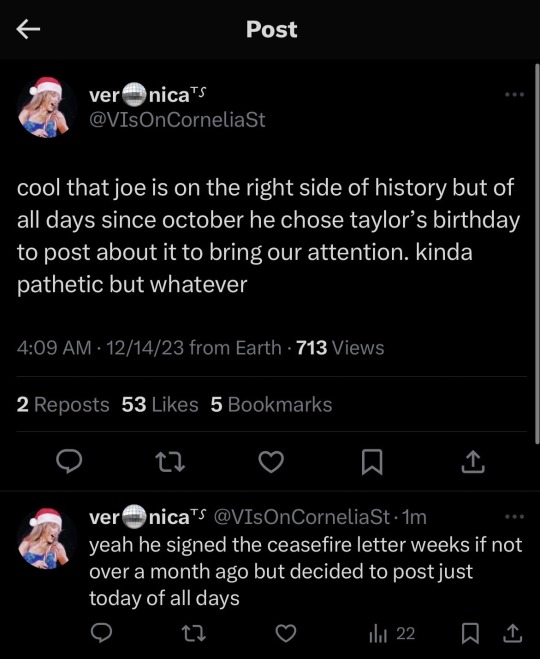
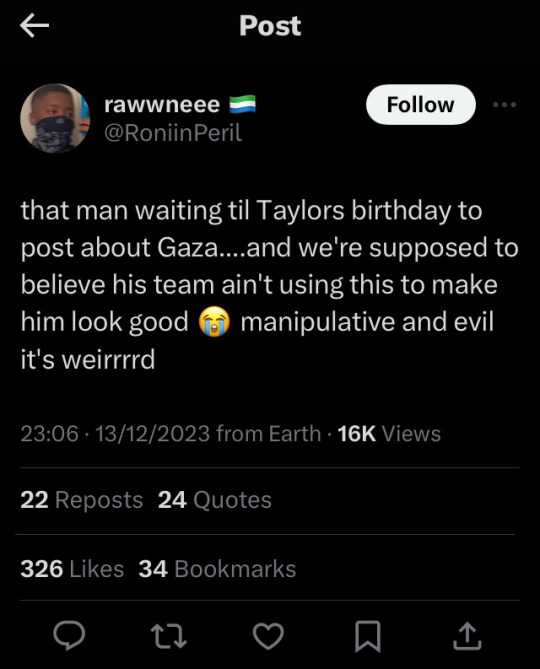
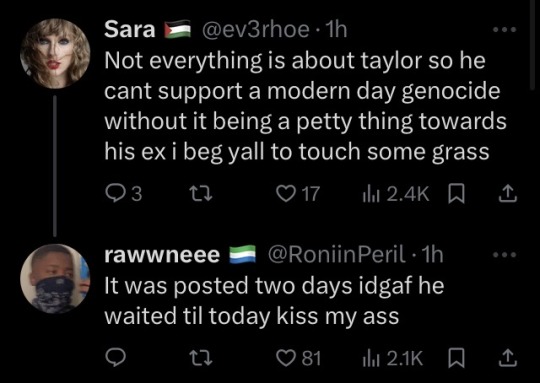
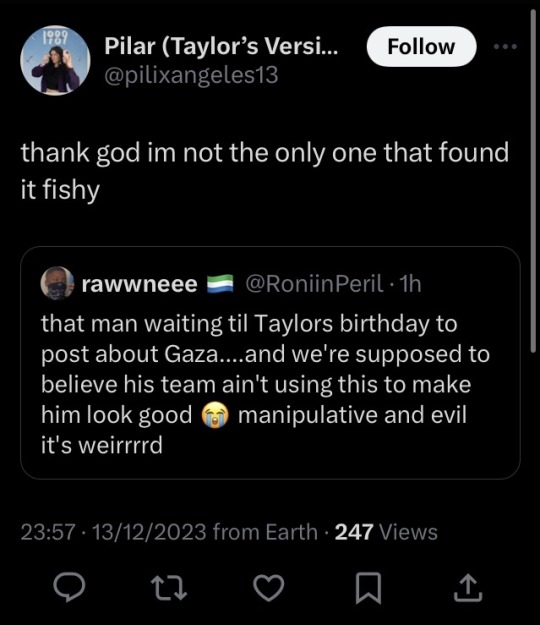
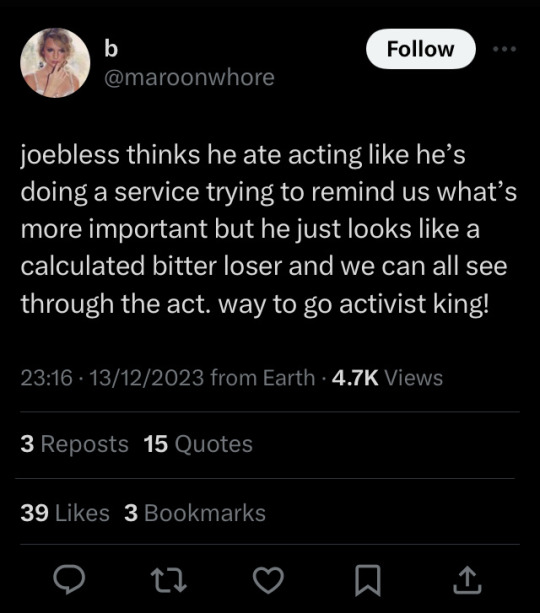
I wish I could tell you that this was all a joke, that these are all parody accounts, but they’re dead serious. and of course we get the conspiracy theory about HIS TEAM trying to make him look good, because anyone who comes online and says anything critical about taylor MUST be a member of joe alwyn’s PR team. 🙄
but yeah, swifties are convinced that joe was trying to SHADE taylor by posting about gaza on her birthday, because s hasn’t said or done shit regarding this issue. also, they literally cannot fathom that there is anything happening in the world that is MORE IMPORTANT than a billionaire’s birthday.
and these swifties really need to ask themselves: WHY does joe alwyn posting about gaza make them SO ANGRY? is it because they’re reminded that taylor has not done or said JACK SHIT about palestine because she’s too afraid to lose money by being too “controversial?”
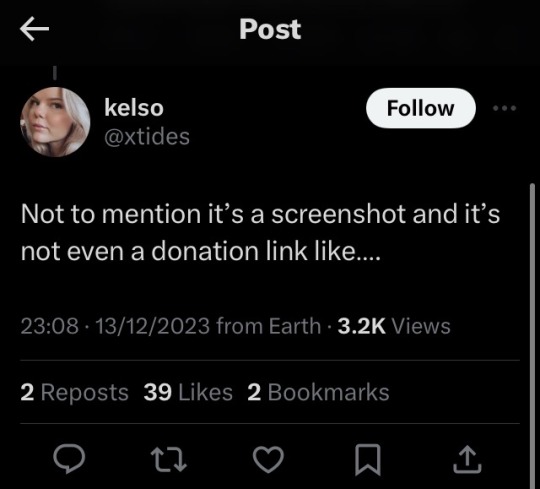
“not to mention it’s a screenshot and it’s not even a donation link like…”
it’s a LINK TO AN ARTICLE and it’s still more than TAYLOR has ever posted?? y’all think he was trying to “shade” taylor on her birthday (even if he was, so what? she + her team + her stupid friends have been shading him SINCE APRIL) by bringing to attention her lack of care about palestine or really any issue that doesn’t directly affect her (or her “home state.”). and the fact is, taylor could VERY QUICKLY AND EASILY shut up the critics who say she hasn’t said or done enough regarding palestine, but she won’t. miss americana, the goth punk billionaire, who spent a whole documentary crying about how she wasn’t allowed to speak up on important issues, has suddenly become ALLERGIC to saying anything remotely political or controversial. and at some point you’re gonna have to ask yourself why.
#shit swifties say#parasocial relationships#joe alwyn#free joe alwyn from the psychotic swifties who stalk his every move#anti taylor swift#toxic swifties
2K notes
·
View notes
Note
Shows or movies based on historic figures and events are hard to pull off if the goals are to be both entertaining and somewhat true to history. If we accept that some inaccuracies can't be avoided in order to appeal to audiences what would you consider cornerstones and pillars about Alexander and his history that can't/shouldn't be touched in order to paint a somewhat realistic picture in media based on him and his life?
I saved this to answer around the time of the Netflix release. For me, there are four crucial areas, so I’ll break it down that way. Also. I recognize that the LENGTH of a production has somewhat to do with what can be covered.
But, first of all…what story is one telling? The story arc determines where the focus lies. Even documentaries have a story. It’s what provides coherence. Is it a political tale? A military one? Or personal? Also, what interpretation to take, not only for Alexander but those around him. Alexander is hugely controversial. It’s impossible to make everyone happy. So don't try. Pick an audience; aim for that audience.
MILITARY:
Alexander had preternatural tactical skills. His strategy wasn’t as good, however, especially when younger. Tactics can be a genius gift (seeing patterns), but strategy requires experience and knowledge of the opposition. The further into his campaign, the more experience he gained, but the cultures became increasingly unfamiliar. He had ups and downs. He was able to get out of Baktria finally by marrying Roxana. That was strategy, not tactics. He beat Poros, then made a friend of him; that’s strategy. Yet he failed to understand the depth of the commitment to freedom among the autonomous tribes south along the Indus, which resulted in a bloody trek south. And his earlier decision to burn Persepolis meant he’d never fully reconcile the Persian elite.
So, it’s super important to emphasize his crazy-mad tactical gifts in all forms of combat, from pitched battles to skirmishes to sieges. Nobody in history ever equaled him except maybe Subatai, Genghis Khan’s leading general. In the end, I think that’s a lot of Alexander’s eternal fascination. He fought somewhere north of 250 battles, and lost none (where he was physically present).
But HOW to show that? What battles to put on screen? Oliver Stone combined three into one + Hydaspes because he had only 2-3.5 hours (depending on which cut you watch). The Netflix series is going to show all four of the major pitched battles…or at least all 3 for the 6-episode first part. They had circa 4.5 hours to play with, but they cut out other things, like Tyre.
Another issue, from the filming/storytelling point-of-view is how to distinguish Issos from Gaugamela for the casual viewer. They’re virtually identical in tactics (and players on the field). So it made a fair bit of sense to me for Stone to conflate them. In a documentary, it’s more important to separate them, largely to discuss the fall-out.
Some v. important clashes weren’t the Big Four. Among these, the sieges of Halikarnassos and Tyre are probably the most impressive. But the Aornos Rock in India was another amazing piece. I’d also include the bridging of the Indus River to illustrate the astonishing engineering employed. Again, if I had to pick between Halikarnassos and Tyre, I’d pick Tyre. I was a bit baffled by Netflix’s decision to show Halikarnassos instead, but I think it owed to an early error in the scripts, where they had Memnon die there. I corrected that, but they’d already mapped out the beats of the episodes, so they just kept Halikarnassos. That’s fine; it was a major operation, just not his most famous siege.
Last, I really wish somebody, someday, will do something with his Balkan campaigns. What he did in Thrace and Illyria, at just 21, showed his iron backbone and quick thinking. It’d make a great “and the military genius is born” set-up, drama wise. But you could use the Sogdian Rock to show the clever streak, at least (“Find men who can fly” … “I did; look up.” Ha) Plus it has the advantage of being where he (maybe) found Roxana.
Last, he fought extremely well--wasn't just good at tactics. Being a good general doesn’t necessarily mean one’s a good fighter. He was. Almost frighteningly brave, so show that too.
RELIGIOUS:
Ya gotta deal with the “Did he really think he was a god?” thing, and the whole trip to Siwah. I obviously don’t think he believed he was a god; it’s one of the things I disliked about the Netflix show’s approach, but they were dead-set on it. I DO think he came to believe he was somehow of divine descent, but of course, that’s not the same as most moderns understand it, as I’ve explained elsewhere. It made him a hero, not a god on a level with Zeus, and to ME, that’s an important distinction that Netflix (and to some degree Stone) rode roughshod over.
But I’d like to see more inclusion of sacrifice and/or omen-reading—religion in general. Cutting the Gordion Knot (omens!). His visit to Troy (Netflix tackled that one). A really cool thing would be to make more of the lunar eclipse before Gaugamela. Again, Netflix touched on that, but it’s one of those chance events that might actually have affected a battle’s outcome, given how seriously the ancient near east took sky omens. (A solar eclipse once halted a battle.) The Persians were freaked out. Even his massacre of the Branchidai in Sogdiana was driven by religion, not military goals. Pick a couple and underscore them.
I give Stone big props for the sacrifice before the Granikos/Issos/Gaugamela battle. It was so well-done, I’ve actually shown it in my classes to demonstrate what a battlefield sphagia sacrifice would look like.
Alexander was deeply religious. Show it.
POLITICAL:
Ah, for ME the most interesting stuff surrounding Alexander occurs at the political level. Here’s where the triumph story of his military victories all went south. He knew how to win battles. He was less good at managing what he’d conquered.
In terms of a story arc, the whole period up to Gaugamela is really the “rise” of the story. Post-Gaugamela, things began to collapse. And I would pin the turn on PERSEPOLIS. Yes, burning it sent home a message of “Mission accomplished.” But he was selective about it. Areas built by Darius I were spared, Xerxes’ were destroyed: a damnio memoriae.
Problem: Persepolis embodied Persia, and ATG essentially shat on it. Not a good look for the man who wanted to replace Darius III. That he also failed to capture and/or kill Darius created an additional problem for him. Finally, his lack of understanding of how politics worked in Baktria-Sogdiana resulted in an insurgency. Bessos was going to rebel, regardless. But Spitamanes might not have. Alexander created his own mess up there.
Another matter to look at is why he created a new title—King of Asia—instead of adopting the Persian title (King-of-Kings). I don’t think that was a “mistake.” He knew perfectly well the proper Persian title (Kshāyathiya)…and rejected it. He adopted some Persian protocol, but not all of it. After the summer of 330, he was essentially running two parallel courts, which seemed to satisfy neither the Persians nor his own men. (Kinda like docudramas are a hybrid that seems to annoy perhaps more than satisfy.)
So I’d like to see this handled with some nuance, but it’s intrinsically difficult to do—even while, if done well, it would be the most interesting part of an Alexander story, imo.
So, what events, what events…3-4 leap out after Alexander’s adoption of some Persian dress. The Philotas Affair, the Pages Conspiracy, the Death of Kleitos, the marriage to Roxana. I’d show it all, although I could also understand reducing the two conspiracies to one, for time, in which case, the Philotas Affair because it resulted in the fall of Parmenion. But the fact there were two, not just one, tells a story itself.
What about the proskynesis thing with Kallisthenes? I’ve come to disbelieve it ever happened, even though it’s symbolic of the whole problem. So, weirdly, I’m of two minds about showing it. OTOH, it won’t be in my own novels. But OTOH, I could easily see why a showrunner or director might want to include it. And it certainly appears in several of the histories, including Arrian.
Then we have the two indisciplines (mutinies)…one in India that made ATG turn around, and another at Opis. They’re really two different things as one was an officer’s rebellion, the other the soldiers themselves. But will viewers be able to distinguish between them? It’s like the Issos/Gaugamela problem, or for that matter, the two conspiracies. They’re similar enough to confuse the casual viewer. “Didn’t we already see that?”
But if they were narrowed to one, how to choose? The mutiny on the Hyphasis provides an explanation for why he turned back. But the Opis event was more dramatic. The man jumped down into the middle of a rioting crowd and started (essentially) knocking heads together! So if I had to pick…Opis. The other might could be mentioned in retrospect.
PERSONAL:
Here are five things I think really OUGHT to be shown, or that I have yet to be pleased by.
1) Philip isn’t an idiot and should get more than 10 minutes of screentime. Oh, and show Alexander did learn things from him. Stone had to make his movie a Daddy-Issues flick, and the Netflix thing did very little with Philip as they wanted to get to the Alexander-Darius face off (which was the meat of their story). But there’s a very interesting love/competition story there.
2) Olympias is not a bitch and was not involved in Phil’s murder, although I can see why that is catnip to most writers. She did kill Eurydike’s baby and (by extension) Eurydike. One of the historians in the Netflix story (Carolyn, unless I misremember) talked about the rivalry between the two wives, at least. But I think ATG planned to marry the widow and Olympias got rid of her to prevent it. Now THAT’S a story, no? But they were in too much of a hurry to get to Persia.
3) Alexander was not an only child! He had sisters (and a brother) with whom he was apparently close…and a cousin who was his real rival. To me, missing that cousin rivalry overlooks a juicy personal/political story! Too often all the focus winds up on Alexander-Olympias-Philip-Eurydike-Attalos, but man, a more subtle showrunner could do a lot with the Alexander-Amyntas rivalry. But he’s constantly cut out. I can’t think of a documentary that actually addresses Amyntas except in passing (if at all)l
4) Hephaistion’s importance is a must, but I’d like to see him treated as someone with a personality and authority of his own, besides just as ATG’s lover. At least Netflix Went There onscreen with the love-story part, but otherwise, the writers couldn’t figure out what to do with him. Neither Stone nor Netflix really portrayed him as his own person. I do understand why they can’t show the whole cast of characters. I had to do weeding myself in the novels, but I’m annoyed Netflix showed only Hephaistion and Ptolemy. Where’s Perdikkas (so important all along really, but certainly later)? Or Philotas, Kleitos, Krateros, Leonnatos, Lysimachos (later king of Thrace)? I think viewers could probably have handled at least another 5 people, especially if introduced gradually, not all at the beginning.
This brings me to….
5) Alexander’s apparently very real affection for the people in his orbit, from personal physician (Philip) to childhood pedagogue (Lysimachos [not same as above]) to Aristotle to various other philosophers. He was so loyal to his friends, in fact, he initially jailed the people who brought word of Harpalos’ first flight.
He needed to be loved/appreciated and wanted to give back to people. Yes, generosity was expected of kings, and as a king (THE king), his generosity had to excel that of anybody else. But he seemed to genuinely enjoy giving presents. I think of him like that one friend who heard you say you liked that cute pair of “Hello, Kitty” socks…then 6 months later they’re your Christmas present from them. Some of his gifts were grandiose, but not always. I love the dish of little fish (probably smelts) that he sent to Hephaistion, presumably just because his friend liked smelts!
To me, point #5 would be easy to get in with a skilled scriptwriter, tucked into the corners of other scenes. It’d be fun to highlight the personal side. If we can believe Plutarch, he was a PRODIGIOUS letter-writer. Also, he loved to hunt, so that’s another thing. And he loved the theatre, and to watch sport. These would all be very humanizing details.
I think the biggest issue is that most of these documentaries/docudramas are done by people who don’t know squat about Alexander aside from a few things, before deciding to make a documentary/movie about him, or write a book. Their research is shallow, and even if they bring on the experts, they don’t always listen. Stone DID at least have a long fascination with ATG, but it caused him to try to throw in everything but the kitchen sink. It wasn't as bad of a film as some have made it out to be, just horribly bloated and for all his reading, he never understood the WORLDVIEW. I wrote about that some while back in my review.
The best documentary/movie would be told by an actual specialist who knew enough at the outset to craft a better, more complex story arc.
Or maybe I’m just biased because I tried to do that myself in my novels. 😂😂😂😂
#asks#alexander the great#oliver stone alexander the great#netflix alexander the great#telling the story of alexander the great is intrinsically difficult#docudramas#historical movies#historical documentaries
91 notes
·
View notes
Text
okay i am an old man at heart & am quickly tired out by videos but i am also a total sucker for participating in the cultural moment when it seems that there is one, so i have now watched about three hours of the hb*mberguy video about plagiarism. it's very annoying, actually, probably because i am an old man & none of the discussion of it i have seen shares my preoccupations & concerns
the problem i am having, & i acknowledge that this is perhaps resolved in the last hour of this four-hour-long youtube extravaganza, is that our intrepid investigator (he's very good at videos! not meant dismissively) declines to like, actually define plagiarism or look into what citation norms are or how they differ in different contexts. the proposed referents are journalists & academics, which is really funny to me because there are regular vicious arguments in both of these communities about what proper credit looks like & what it's meant to do, and both of these fields have been around as pretty established things for a few hundred years now (you could argue this point, especially regarding when precisely academia or journalism became recognizably modern). there have been a reasonable number of pretty high-profile arguments about what constitutes citation malpractice in both fields over the last few years, & there aren't necessarily neat conclusions (not referring to e.g. maura dykstra situation of obvious & widely agreed upon malpractice; i mean, people arguing about what the politics of citation are & what our responsibilities are—for example, academics regularly complain that journalists will consult them or read their work for a piece & then not cite them in it, journalists complain that academics will brush past their work when compiling bibliographies, academics across disciplines have several long-simmering differences of opinion about what kinds of politics one expresses with one's citations, journalists argue about credit & republication; i am not an academic or a journalist, so i am missing a lot!).
anyway setting these problems aside, there's the bigger issue that youtube videos as a rule are, i realize this is controversial, not academia and also not journalism. i don't think they are documentary filmmaking either, although our hbomb man is not particularly interested in the information culture of documentarians either. internet video is its own thing with its own information culture! but instead this is a video about how some people i have never heard of before on youtube did unethical stealing from other people i have mostly not heard of before, which i agree is not great but it does not seem to me like a four-hour emergency, probably because i am an old man who doesn't understand youtube. like, okay, we spent several lengthy minutes on what's going on with this illuminaughty person copying documentaries, but that argument felt to me weirdly both belabored & underdeveloped: yes, yes, we get it, the whole thing was lazily cribbed, i agree, that's really obnoxious, sure, okay, but like, do we have some articulation of what the line is? of what the norms are? because it seems to me like we kind of don't have a clear way that we handle citation in that space, by which i mean not just like 'APA format' or whatever but the substantive idea of referring to & building upon other people's intellectual work
please note here that i did not say 'intellectual property', because to me this is of course the elephant by the floral wallpaper. maybe it's in the last hour & i simply lack staying power! well-documented personal flaw! but in my experience, functional definitions of 'plagiarism' & theft of intellectual property arise only from disciplinary processes, either academic proceedings or legal ones, & each case is decided individually. more importantly as others have pointed out, when we make someone's ideas into legally codified property, they become alienable from their creator; intellectual property is a kind of enclosure of the commons. there's a reason i think that hguy's last video was about the ownership of a sound effect, & that he spent a lot of time being angry that someone else claimed the credit along with the legal ownership of/right to profit from the sound effect; the frustration with youtubers appropriating other people's work & the frustration with some bozo video game composer lying about how the "oof" got made are the same thing, but the thing is not "credit" or "rudeness" or "theft," it is the entire institution, i think, of intellectual property. not that there have never been reasonable claims made using intellectual property law, but come on almost none of this is the māori suit against lego, it's mostly corporate C&Ds and NDA'd artists stuck with non-competes. it's bleak! but we know how it happens, & it's not that some people are uncreative & moneygrubbing, so they look down on creatives (??), which has so far seemed to be the argument of this four-hour-long cultural moment
also i am still thinking about what kind of ideas & assumptions go into citation pratices, because i am a professional librarian (a bad one!), so i am professionally obliged to care about the set of skills referred to as 'information literacy' (the skills are real but i have like, mixed feelings about the framing, that's why scare quotes). if you are an academic librarian they will ask you to do 'information literacy,' and a lot of what they mean by that is 'tell students how to find sources for things & cite them properly,' which is, i think, kind of an interesting sleight of hand, in which a broad & powerful set of interpretive & analytical skills become [what is for many students] the dullest part of essay writing? but that's a problem with all of undergraduate education, basically. anyway if you talk to most students about citations they think they're onerous nonsense, and that plagiarism/'academic honesty' policies are arbitrary (& scary); they're not usually encouraged in any particular way to think about how citations are meant to function or what they're meant to do. i don't mean to disparage my colleagues in academic libraries; i am painting with a broad brush & anyway librarians usually have almost no input into course design or assignments.
it's disappointing how these information literacy discussions tend to go, though, because citations are interesting! they're also recent, in the grand scheme; the idea of telling us where you got some idea or other is very old, but the specifics of how & in what circumstances you're meant to do it aren't & they vary wildly by context. i often will tell people where i picked up whatever little factoid i am drolly recounting (sorry everyone) but that isn't particularly common in casual conversation. youtube videos are closer to a conversational register than they are to a documentary or a news article, much less an academic paper; i don't really know what to make of it, & i suspect this is part of why it is so easy to be a youtube personality who steals other people's work—it isn't really that youtube audiences are uniquely credulous & lazy, but that their expectations aren't the same. i guess i should note here that i do think you should cite things in a clear & easily followable manner, be honest about what is your own invention & what is borrowed from the work others, and avoid like. being a huge asshole. but to some degree i am bored by hearing about Some Guy Who Lies On Youtube, because my baseline assumption for most youtube videos is that they are not reliable & are probably trying to lie to me! i am not trying to be superior here that is an honest account of how i engage with anyone who appears to have a specialty lighting rig
i think continually & with affection of the late antique proliferation of the pseudo-somebody, and it seems to me now that the common modern practice of online (kindly) under-citation is a near-perfect inverse of the medieval approach, in which it was generally difficult to look things up and writers enhanced their authoritativeness by making referential claims to well-known authors. now it's usually easy to look things up & everybody wants to be an original thinker & an artist, so they don't cite. not me, though, i am just giving you here the garbled mash of things i've seen in posts & remember from my undergrad lectures eight years ago. i'm an idiot! but at least nobody here is making any money :)
#am i being weird about this because i told my partner that one of my friends once said i would 'make a good youtuber'#& my partner instead of saying 'wow that was mean i can't believe she said that to you' said 'you really would'? um. no. i'm normal about i#youtube is a blight & yet i cannot eat dinner in silence okay i'll die#please feel free to weigh in or argue#truly this post is not meant to be like dismissive or whatever i am just an old man. i am rubbernecking :)
24 notes
·
View notes
Text
by Shiryn Ghermezian
The Philly Palestine Coalition on Monday began a petition that demanded the cancellation of the film festival, which is co-sponsored by Israel Bonds, the Consulate General of Israel, and the Jewish Federation of Greater Pennsylvania. The pro-Palestinian group falsely claimed that Israel Bonds “finances the Israeli government’s budget” and “directly contributes to the displacement of Palestinians, the expansion of unlawful settlements, and unchecked settler violence.” The petition also falsely accused the state of Israel of genocide, apartheid, and occupation in its treatment of Palestinians living in the Gaza Strip.
According to the Israel Bonds website, proceeds from the sale of bonds have contributed to Israel’s growth in high-tech, cleantech, and biotech. Capital from Israel bonds have also “helped strengthen every aspect of Israel’s economy, enabling national infrastructure development … [and] expanded transportation networks enabled by investments in Israel bonds help facilitate shipment of ‘Made in Israel’ technology around the world, enhancing national export growth.”
Soon after facing pressure from the Philly Palestine Coalition, the BMFI announced on Monday it pulled the screening of The Child Within Me — a day before the scheduled event.
“Bryn Mawr Film Institute is not a political organization. We don’t endorse or oppose any causes,” the BMFI said in a released statement. “In past years, we have not regarded hosting a screening from the Israeli Film Festival as a political partnership or taking a stance on any issues. This was our feeling when we arranged the 2024 screening many months ago. However, as the situation in Israel and Gaza has developed, it has become clear that our showing this movie is being widely taken among individuals and institutions in our community as an endorsement of Israel’s recent and ongoing actions. This is not a statement we intended or wish to make.”
“BMFI is a safe place for civil and nuanced conversations about diverse stories,” the film institute added. “For the well-being and safety of all patrons, BMFI will not be a location for anger and violence. For those who wish to partake in an IFF screening, there are upcoming screenings at other venues.”
The Jewish Federation of Greater Philadelphia and the Anti-Defamation League’s chapter in Philadelphia were outraged by the move. They urged the BMFI to immediately reverse its decision to cancel the screening.
“Although BMFI states that this decision was made in an attempt to avoid controversy, this action only serves to blacklist Israeli culture, playing into the hands of antisemites who try to deny the Jewish people their voice and existence,” the two Jewish organizations said in a joint statement on Tuesday. “The IFF intentionally offers a multifaceted view of Israeli society. Each season, carefully curated feature films and documentaries provide glimpses into the intricate tapestry of Israeli life, allowing audiences to form their own informed opinions … Let us celebrate cultural diversity, promote dialogue, and recognize the transformative power of film in connecting us all.”
13 notes
·
View notes
Note
It's not new but I hate how celebrities use activism for publicity too. Why can't they do it genuinely like p!nk or boygeniuse. I'm so annoyed by Beyoncé or Kardashians or even Joe A too. look at what they've posted and their timing. And they don't have to make an announcement everyone they donate too.
I understand why you would be pissed off about this but at this point, I think that argument is irrelevant. Instead, I look at the material impacts of activism (even if it's performative). The material impact of these influential people speaking out on issues that matter and partaking in activism is what's important.
For example, a lot of people were annoyed with Taylor Swift for only speaking out against being a darling of the alt-right when it was no longer controversial for her to do so.
In fact, many people including her fans, were upset by her silence for a long time and kept bringing it to her attention because Trump and his supporters would play her music at their events and speak about how much they like her. Her critiques have said that she only broke her silence when she had to and that it was 'performative' because she turned it into an era and spoke about being an activist in her documentary. Some people have even said it was a strategy for her to stay relevant because her career hadn't returned to its 2014/2015 peak.
For me, as a queer woman, it doesn't matter that much whether she genuinely cared about the LGBTQIA+ rights that she championed for or if it was a way for her to stay relevant in 2019. What matters is that she went through with it because, ultimately, her activism makes a difference. Social change progresses when we speak out publicly.
Anon, there are many things to be annoyed at in the world but this shouldn't be a priority. My advice is to pick and choose your battles. Don't waste your breath on this. Is Joe perhaps being politically active as a way to benefit his public appearance? Maybe. Maybe not. Does it matter? Not at all.
What matters most is to be on the right side of history and use our limited time on this planet to do the right thing. We can do this by speaking up on important causes or finding another way to show solidarity with those who need it.
Peace & Love, sweet anon <3
#taylor swift#taylorswift#ts#the eras tour#joe alwyn#beyonce#kim kardashian#palestine#swifties#activism#lgbtqia#donald trump#republicans#miss americana
7 notes
·
View notes
Note
https://www.theguardian.com/music/2023/may/19/pop-stars-must-do-more-to-defend-lgbtq-fans-taylor-swift
Taylor Swift has flagged her sympathies with this community, so why is her Eras tour visiting US states enacting repressive laws without comment?
Look what an overly aggressive security guard made Taylor Swift do. Over the weekend, the singer won praise for calling out a guard, mid-performance, who was being rough with a female fan.
However, as a queer Swiftie, I can’t help but wish she would channel that same energy and her enormous platform into denouncing the record number of anti-LGBTQ+ laws being introduced across the US. Since starting in March, Swift’s Eras tour has taken her to numerous states that have ushered in some of the most extreme anti-LGBTQ+ bills in decades, including Florida, Tennessee and Texas. Yet the singer has stayed silent.
For some, Swift’s silence undermines, or at least draws into question, the flurry of LGBTQ+ advocacy she embarked on in 2019. After a gay friend helped Taylor realise her position on LGBTQ+ rights wasn’t “clear enough or loud enough”, she came out swinging for the gays. Close to a million people signed her petition in support of the Equality Act, she brought drag queens on stage with her at a major award show, and also made enormous donations to LGBTQ+ charities such as Glaad and the Tennessee Equality Project. (She also released the homophobe-bashing single You Need to Calm Down, though perhaps erasing that from our collective memory would be more of a win for LGBTQ+ rights.)
When Swift broke her political silence in 2018 by publicly supporting two Democrats in the US midterm elections it felt like a watershed moment. The singer had seemed to have gotten over being “so fearful of making a mistake that [she would] just freeze”, as she once told Vogue. As she said in her 2020 documentary, Miss Americana, she cared more about being “on the right side of history”. Which is why her silence now feels so loud.
But the issue of pop and politics goes beyond Swift, raising questions about our expectations of pop stars, figureheads who have by and large become more politicised over the past decade. Should artists use their platforms to speak out on social issues, and if so, how often and to what extent? (The current calls for Swift to denounce past controversies by her rumoured boyfriend, Matty Healy of the 1975, for example, are both misogynist – expecting a woman to account for her partner’s behaviour – and demonstrative of fan entitlement.) Do we expect them to understand and respond to all the hot-button issues going on around the world? Which countries (or states, for that matter) is it OK for them to perform in?
Now more than ever, these are valid questions to ask of pop stars. Major pop tours are watercooler events akin to sports games, Succession and Eurovision: one of the biggest platforms around, speaking directly not only to young audiences who look to their idols for support, but the wider public who might be influenced by their views. And queer fans can reasonably expect to see support for their causes because today’s pop spectacle was built on the backs of trailblazing queer icons, to whom every star owes a spiritual debt. (In 2017, Swift’s Reputation tour paid nightly tribute to the 19th-century US dancer Loie Fuller, a gay woman who pioneered modern dance and theatrical lighting and fought for artists to own their work.)
It’s understandable that many stars are wary about speaking out, particularly when on stage. Audiences have come for a show, not a political rally. Perhaps that’s why some stars opt for softer actions, such as Harry Styles waving a Pride flag or Beyoncé making venue toilets gender-neutral on her current Renaissance tour. These gestures of support can mean so much for a young queer or questioning fan. But Madonna put her career on the line in the 80s and 90s with her HIV/Aids activism, including a card detailing The Facts About Aids enclosed with 1989’s Like a Prayer album. Considering we’re living through an era of humanitarian and climate crises with a growing backlash against the rights of women, people of colour and LGBTQ+ people, today’s pop stars aren’t taking radical enough action.
So while we can applaud artists such as Lizzo, Orville Peck, Kelsea Ballerini and Hayley Kiyoko for their recent advocacy against the anti-drag and trans laws emerging across the US, statements and symbolic gestures won’t do anything to help the families of queer and trans kids fleeing Texas and Florida. What matters today is how pop stars who want to make a difference use their voice, platform and wealth to materially improve the lives of vulnerable communities. Shortly after the Grenfell tragedy in 2017, Adele stopped her Wembley concert to plead with the audience to donate £5 to the Unite for Grenfell relief efforts. On the Eras tour, it’s been revealed that Swift is making “sizeable” donations to local food banks at each stop.
Boycotts can also be effective. It was only seven years ago that North Carolina introduced an anti-LGBTQ+ bathroom bill, which sparked such a huge backlash that businesses left the state and major sporting events and concerts were cancelled. Less than a year later, the draconian law was repealed. LGBTQ+ communities are fighting for their freedom and it’s those kinds of actions that could make a meaningful difference to their safety. Imagine if pop stars highlighted local queer groups at each of their concert venues with donation stands. Or if they signposted information about local, state and national politicians fans could contact about anti-LGBTQ+ legislation. It would also be extremely powerful to see this done by artists without obvious queer fanbases such as Drake or Bruce Springsteen (who was among the artists to cancel shows in North Carolina in 2016).
With all eyes on these tours and every moment being beamed directly to TikTok, they’re one of the most powerful platforms out there and it’s devastating that more isn’t being made of these opportunities. The era of speak now is over. It’s time for pop stars who care about equality to act now.
45 notes
·
View notes
Text
A Brief Summary on Kiwifarms and Keffals, for Radblr
Kiwi Farms, formerly known as CWCki Forums, was a forum website that originated due to the fascination with Christian Weston Chandler, the creator of the comic Sonichu and who is currently awaiting trial for sexual battery against his mother who has deteriorating cognition due to her age. For an in-depth reason as to why Christian Weston Chandler became a fascination with people, here is the link to the ongoing documentary series.
The site changed its name once it became to branch out into discussing people that they saw as behaving just as eccentrically as Chandler, referring to them as lolcows (hence the farms in their name). The website talks in a manner similar to the "old internet", more specifically mannerisms from older 4chan. Lolcows are not exclusive to a certain political party, group, or identity. In order for a website like Kiwi Farms to take an interest in a person, they must fulfill the requirements of this term.
Stefan Blitz published an interesting read back in 2012 that references the reasons into why users such as those from Kiwi Farms would take an interest in an online figure: unwarranted self-importance; disturbing secrets, typically of a sexual nature; unhealthy obsessions; and a person's responsiveness to inflammatory comments.
For anything good you can say about the site (Kiwi Farms aided in archiving evidence against a group of animal and child abusers), there is something bad you can say about the website.
Because of how Kiwi Farms users speak, Kiwi Farms does not appear rules of conduct. However, the main rule I could find from accessing the site before its deletion was a rule to not engage with the people that they were discussing. I do not know how strict this rule is due to Null's previous engagements with Chandler, but the rule appears to have become stricter after Chandler was extorted by a group called the Idea Guys (see link to the documentary). Users do, however, doxx people of interest, and their common justification is either that the people of interest made their location public knowledge, such as Christian Chandler (or arguably Keffals in some certain incidents), or that the information is publicly accessible due to the existence of websites such as Facebook and the WhitePages. From that perspective, doxxing is viewed as an ethical problem rather than a legal problem.
In Regards to the Alleged Connection to Mass Shootings
The connection to a mass shooting is in reference to the Christchurch shooting in New Zealand. Users from New Zealand had archived the video footage that was streamed by the shooter's Facebook Live. New Zealand authorities contacted the administer of Kiwi Farms for the IP addresses of New Zealand users to prosecute for disturbing obscene materials, but Null had refused (in a rather rude manner).
Kiwi Farms and Suicide
The claim of the three suicides being related to Kiwi Farms is more complex. Of course, it is understandable people have an impression as these accountants as true when Kiwi Farms users are seen making fun of the claims.
The most common accountant revolves around a programmer named that went by the name Byuu or Near, who was best known for emulation of the N64. When a user had created a thread dedicated to Byuu's online footprint and controversies, the thread was interacted with irregularity until Byuu responded on 7 February, 2020, to his thread. He initially responded positively to the thread. However, Byuu would go on to e-mail Null to have his thread taken down, stating he planned to commit suicide if his request was denied. Here is a video I found with screenshots of the thread, as the .ru link is having technical issues, and here is a mirror of Null discussing Byuu on his livestream, Mad at the Internet. (Note: Again, Kiwi Farms speak is similar to the speak of Old Internet/4Chan. That includes Null).
Sagal's death is more complicated, as the behavior by Kiwi Farms users could have been a potential factor in their death, albeit not the main reason. Sagal was a video game developer who became known due to an incident with Indiegogo. Sagal started an Indiegogo on the premise the money would go to a shrapnel removal surgery. However, the website would remove their campaign under "suspicious activity," alleging when it was revealed the $35,000 was not for the surgery they stated. It would be confirmed that the funds went instead to gender reassignment surgeries. Years later, Sagal would sit down in Lownsdale Square and read a statement they wrote about homelessness and mental health. They would then doused themselves in a flammable liquid and set themself ablaze. After either a fire hydrant or fire extinguisher had been located (accountants had different reports on the item that doused the flames), a witness asked them why they had done the action. Before they died at the hospital due to injury, Sagal was reported to be in a state of shock, but it is alleged that they said their actions were because they were homeless and did not know what else to do. Their death has been suspected to be an example of the most extreme forms of political protest.
Like Sagal, Julie Terryberry's death was complicated. Dying at the age of 19, the focus on Kiwi Farms users' response to her online presence led to multiple outlets ignoring the role that predatory adult men took in the situation. It is confirmed that Julie Terryberry was isolated to the house of Mike Holland at the age of 18, but it suspected that Mike Holland had her in his home at a younger age. Mike Holland was age 28 at the time her thread was posted, with Julie having just turned 18. Mike Holland would have Julie residing in a cluttered shed, beat her during sex, and would also pressure her into camming. I will not be looking for an archive of her thread, as I believe it is likely that explicit photos of her are within the thread.
Who is Keffals?
Keffals is a Canadian internet streamer, known for a fixation with ratioing on Twitter. He became notorious after claiming he was the reason another streamer, Destiny, was banned from Twitch. His reason for advocating for the streamer's ban was due to his position on transgender male athletes in female sports during a live-streamed debate. If it is to be believed that Keffals is responsible, it would have been most likely due to Keffals having his follower base mass report Destiny from the website.
Last month, Keffals was swatted when an impersonator sent out a mass e-mail to Canadian politicians. Keffals' reaccounting of the incident would change when interviewed. Online, Keffals would say he had been woken up to a rifle in his face [0:00-0:06]. When interviewed by Global News, Keffals would say he had walked into the hallway where he first saw the assault rifle. Ontario authorities released a report which stated that officers had knocked on Keffals' door with guns pointed at the ground. The authorities would seize his electronics, which prompted his discord moderators to begin mass deleting.
Keffals would have his location doxxed by a female Kiwi Farms user when he posted pictures of his cats on his hotel bed. He would be doxxed a third time when he uploaded photos of food sent to his airbnb, despite being told that he was confirming his location by doing so. Keffals then announced plans to leave Canada for Ireland on stream, again with protest from supporters to not share this knowledge with them, which lead to his most recent doxx when he then also announced the name of the person he would be staying with.
The allegations of inappropriate interactions with underaged people by Keffals is in relation to him sponsoring the DIY HRT Directory, as well as his former Discord group known as "Catboy Ranch."
DIY HRT Directory
When accessing the DIY HRT Directory, you will scroll down and see the cautionary warning that the site does not provide medical advice and to seek advice from a qualified healthcare provider. However, statements made by those in relations to the website have indicated no disagreements with advertising the site to underaged persons.
Within the guide titled 'transfem,' it is noted that all forms of HRT will likely make the user infertile. If a user does become infertile, it will likely be irreversible. Other notable side effects can include blood clots, dehydration, B12 deficiency, depression, liver toxicity, and lung toxicity. After the section about side effects, it goes into a section titled 'Homebrewed vs. Overseas.' Although they acknowledge that medicine produced by pharmeutical companies have less inherent risks to consuming, the section then reads, "If you want to acquire DIY injections that aren’t prohibitively expensive/difficult to source, homebrewed injections are the only options available" (DIY HRT Directory). Finally, Sourcing/Dosing goes into detail on how to "do-it-yourself" for hormone-replacement therapy.
Curiously, the guide titled 'transmasc' does not have a section for side effects. It is much shorter than the other guide, which makes it go into do-it-yourself instructions much quicker. It does mention the legality of testosterone in passing, though.
Catboy Ranch
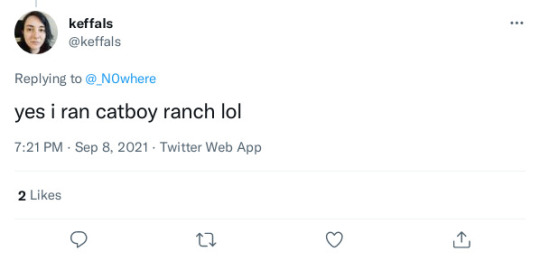
Catboy Ranch was a Discord server ran by Keffals and other adults. The twitter account for the server is believed to be have ran by Keffals at some point. The imagery around Catboy Ranch was inherently sexual in nature, as were the conversations and content within the server. Allegations include illicit materials from minors, sexually explicit conversations between minors and adults, and sending petplay collars to users which have a subset of minors in the userbase. It is still debatable if Keffals was one of the adults who actively engaged with the minors on Catboy Ranch or if Keffals was one of the adults who refused to take action against what they were witnessing. Either way, it shows that Keffals is irresponsible at best and malicious at work.
#radblr#radfem#radfems please interact#radfem safe#radical feminist community#radical feminist safe#radical feminists do interact#radical feminists please interact#radical feminists please touch#gender critical#gender critical feminism#gender criticism
83 notes
·
View notes
Text
A performance venue that received "substantial amounts of public money during Covid" is peace spring a woman because TQ+ activists don’t want to hear from a Lesbian with gender critical views.
SNP MP Joanna Cherry has told BBC Scotland she has been cancelled by an Edinburgh venue for "being a lesbian with gender-critical views".
She was due to appear at The Stand during the Fringe Festival in August.
The venue has cancelled the event after staff said they were not comfortable with her views on transgender issues.
The Edinburgh South MP is a critic of Scotland's Gender Recognition Reform plans, which make it easier for people to change their legally-recognised sex.
Ms Cherry told BBC Radio Scotland's Drivetime programme: "I would hope The Stand would see sense here. Staff shouldn't be framing editorial and artistic policy.
"I'm being cancelled and no-platformed because I'm a lesbian, who holds gender-critical views that somebody's sex is immutable.
"I've made those views clear over a number of years. I have never said that trans people should not have equal rights.”
The show was part of an In Conversation With series of events with interview guests including film director Ken Loach, former Labour leader Jeremy Corbyn and Greater Manchester mayor Andy Burnham.
Ms Cherry said she was planning to talk about her career in politics and the independence movement, as well as her feminist views.
She added: "Because a small number of people don't like my feminist and lesbian activism, I'm being prevented from talking about all of those things in my home city where I'm an elected politician.
"I think it says something's gone very wrong in Scotland's civic space.
"Small groups of activists are now dictating who can speak and what can be discussed."
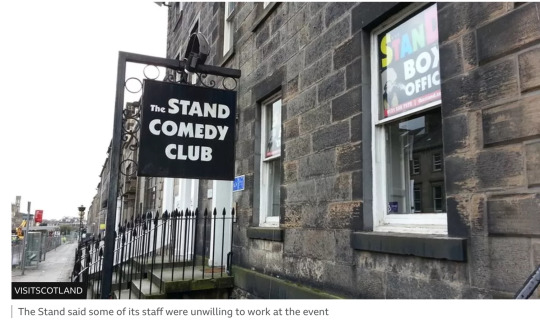
The Stand - which was co-founded by SNP MP Tommy Sheppard - said it did not endorse the views of any participant in the In Conversation With series, which is organised by independent producer Fair Pley.
In a statement The Stand said: "Following extensive discussions with our staff it has become clear that a number of key operational staff, including venue management and box office personnel, are unwilling to work on this event.
"We will ensure that their views are respected. We will not compel our staff to work on this event and so have concluded that the event is unable to proceed on a properly staffed, safe and legally compliant basis."
Scottish Conservative MSP Rachael Hamilton said the Stand had received "substantial amounts of public money during Covid" and many people would be "dismayed" by the stance it had taken.
She added: "Whatever views people have on this sensitive issue, it cannot be acceptable to shut down free speech."
Last week, a screening of the Adult Human Female documentary was cancelled for a second time by the University of Edinburgh on safety grounds after protests by trans rights protestors.
The film is billed as an "explainer about the issues, how far things have already changed for the worse for women and how difficult it has been to be heard, to be listened to", with its producers saying that accusations that it is transphobic are "designed to shut down debate".
Some university staff and student groups said the documentary contained content that was "a clear attack on trans people's identities".

First Minister Humza Yousaf has called on the university to defend freedom of speech and to allow robust debate and discussion.
He added: "I see that as no conflict with the other stance that I'm very proud of, which is supporting trans rights. That is something that I am unequivocal about.
"But we should ensure that our universities - and society more generally - are a place where we can have that robust exchange of ideas."
Mr Yousaf has launched a legal challenge to the UK government's block on controversial gender self-identification reforms that were passed by the Scottish Parliament in December.
Ms Cherry was among the senior SNP politicians who opposed the legislation, which aims to make it easier for people to change their legal sex and lowers the age at which they can do so from 18 to 16.
Meanwhile, Ms Cherry also told BBC Scotland she hoped the SNP would get its "finances and governance in order" amid a police investigation and the resignation of the party's auditors.
Ms Cherry, who resigned from the SNP's national executive committee in June 2021, said: "I was one of a number of members elected on a manifesto to deliver better transparency and scrutiny over the party's finances and governance.
"I'm sad to say we failed to do that, and it wasn't for the want of trying.
"I just regret it's come to this. I would like those who stood in the way of reform back in 2020-21 to reflect on what they've done."
Ms Cherry also said the party had not done "the necessary groundwork" on economic issues under former first minister Nicola Sturgeon to win over opponents of Scottish independence.
She added: "I've always argued that the way to win a referendum was to persuade people who voted no in 2014 of the merits of our case.
"The SNP needs to discuss both how we convince people to the cause of independence and also how we actually win our independence.
"We need to put the sovereignty of the Scottish people back to the front and centre of our debate."
#UK#Scotland#SNP MP Joanna Cherry#Deplatforming a woman#The Stand Comedy Club#fringe Festival#Scotland’s Gender Recognition Reform#Drop the T
5 notes
·
View notes
Text
Tinubu’s outburst on 25 per cent FCT votes sparks fresh controversy
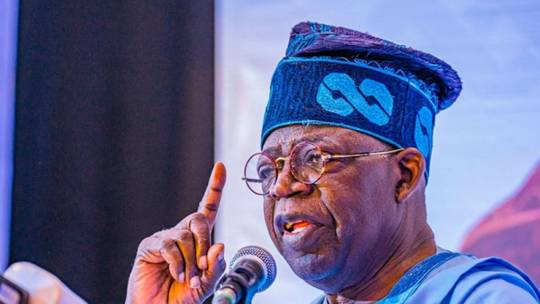
The candidate of the All Progressives Congress, APC, in the 2023 presidential election and now President and Commander-in-Chief of the Armed Forces of the Federal Republic of Nigeria, Bola Ahmedu Tinubu, stirred the hornet’s nest recently when he cautioned the Presidential Election Petition Tribunal, PEPT, against attempting to remove him from office on the grounds that he did not get 25 percent of the total votes cast during the presidential election in the Federal Capital Territory, FCT, Abuja.
He warned that such action could lead to chaos and anarchy in the country.
President Tinubu asked the election tribunal to dismiss the petition seeking the nullification of his election for not securing 25 percent of the lawful votes cast in the FCT, arguing that having scored 25 percent in about 30 states of the federation, his failure to obtain 25 percent in the FCT would not be strong enough to deny him of his hard-earned victory.
Tinubu contested the February 25 presidential elections on the platform of the APC and was declared the winner by the Independent National Electoral Commission, INEC, after polling 8,794,726 votes to beat his closest rivals, Alhaji Atiku Abubakar of the Peoples Democratic Party, PDP, who polled 6, 984, 520 votes to place second, and Mr. Peter Obi of the Labour Party, LP, who came third with 6,101,533 votes.
However, Atiku and Obi had approached the election tribunal seeking to upturn Tinubu’s victory on the grounds that the elections were characterised by massive rigging as evidenced in the alleged widespread voters’ intimidation and suppression, ballot box snatching and destruction, over-voting, results manipulations, thuggery, vote buying, INEC’s failure to abide by its own rules and procedures, physical assault on voters, among others.
Apart from these, Atiku and Obi also want Tinubu’s victory to be nullified because he did not score 25 percent of the total valid votes cast in the FCT, which according to them, is a constitutional requirement before anybody can be declared president of Nigeria.
Since Tinubu’s declaration as the winner of that election, political discussion has been swinging like a pendulum. Nigerians, who prior to the elections were passive politically, had suddenly become active, discussing and analysing political developments from the election tribunal.
Analysts are united in agreement that never in the history of Nigerian politics has there been the kind of political awareness and participation that were witnessed during the 2023 general elections.
They also agreed that the country’s political firmament has never been as charged and ominous as it was between the period when Tinubu was declared the winner of the presidential election and May 29, when he was actually sworn in as the president of the Federal Republic of Nigeria.
However, Atiku and Obi have pursued their case at the election petition tribunal with each presenting before the tribunal pictures, videos and documentary evidence to prove that Tinubu should not have been declared as president in the first place, not to talk of swearing him into the office.
The issue around Tinubu’s failure to get 25 percent of the votes cast in the FCT appears to be the strongest point against the president since it is a constitutional issue and does not require presenting any witness by the petitioners.
But Tinubu, through his legal counsel, Wole Olanipekun, in a final written address to the tribunal against the petition, argued that the FCT is the 37th state for electoral purposes. He stressed that any other interpretation would “lead to absurdity, chaos, anarchy and alteration of the very intention of the legislature.”
Stressing that the petition is novel but not familiar with the electoral law, Olanipekun said: “The issue in this address is very novel in the sense that it is not a petition stricto senso, familiar to our electoral jurisprudence, as the petitioners are not, this time around, complaining about election rigging, ballot box snatching, ballot box stuffing, violence, thuggery, vote buying, voters’ intimidation, disenfranchisement, interference by the military or the police, and such other electoral vices.”
The lawyer was specifically addressing a section of the Nigerian Constitution, which provides that a presidential candidate must score 25 per cent of the votes in two-thirds of Nigeria’s 36 states and the Federal Capital Territory, Abuja.
Since Tinubu was declared as the winner of the presidential election without scoring 25 percent in the FCT, several opinions have been expressed on the matter by Nigerians of all classes, including those that are not lawyers.
There are those who have kept on insisting that the constitution considers Abuja as one of the states in the country. Those on this divide are saying that the word, ‘and’ as used in the constitution, ‘36 states of the federation and the FCT,’ does not really mean that the FCT is different from the 36 states of the federation. To them, the FCT is just the same as any other state of the federation.
They, therefore, posited that Tinubu, having scored 25 percent of the votes cast in about 30 states, is eminently qualified to be declared president since the constitution said a candidate must secure 25 percent in two-third of the 36 states and the FCT, which is 24 states.
However, there are those who insist that the word, ‘and’ as used in the constitution simply means that if any candidate who scores 25 percent of the votes cast in two-third of the 36 states, fails to score 25 percent of the votes cast in the FCT, such a candidate has not met the constitutional requirement and should not be declared president.
They further argued that if the framers of the constitution had a different thing in mind, they would not have inserted the word, ‘and’ there. They also disagreed with those who said that the FCT is just like any other state in the federation because while a state has a governor, who is elected by the electorate, the FCT does not have a governor, but a minister who is an appointee of the president.
However, there are others who believe that even though the constitution provides that securing 25 percent votes cast in the FCT is a compulsory requirement before any candidate could win the presidential election, it would be left for the judges to look at what will best serve national interest and unity before they pass their judgement.
However, Tinubu’s legal team seems to have agreed with those on this side of the divide as they are also saying that the courts have always been careful about giving extreme interpretations of the Constitution that could spark chaos.
“Our courts have always adopted the purposeful approach to the interpretation of our Constitution, as exemplified in a host of decisions,” the team said.
Tinubu’s legal team is also insisting that residents of the FCT, Abuja, are not more special than Nigerians from the other 36 states and cannot be treated specially.
The team said: “In concluding our arguments on this issue, we urge the court to hold that any election where the electorates exercise their plebiscite, there is neither a ‘royal’ ballot nor ‘royal’ voter; and that residents of the FCT do not have any special voting right over residents of any other state of the federation, in a manner similar to the concepts of preferential shareholding in Company Law. We urge this court to resolve this issue against the petitioners and in favour of the respondent.”
Pushing the argument further, the President’s legal team is also arguing that 25 percent votes cast in the FCT is not required by law for a president to emerge.
“May we draw the attention of the court to the fact that there is no punctuation (comma) in the entire section 134(2)(b) of the constitution, particularly, immediately after the ‘States’ and the succeeding ‘and’ connecting the Federal Capital Territory with the States. In essence, the reading of the subsection has to be conjunctive and not disjunctive, as the Constitution clearly makes it so. Pressed further by this constitutional imperative, the Federal Capital Territory, Abuja, is taken ‘as if’ it is the 37th State, under and by virtue of section 299 of the Constitution.”
However, the comment credited to President Tinubu’s legal team that removing him as president over his failure to score 25 percent of the votes cast in the FCT might lead to the breakdown of law and order in Nigeria has sparked another round of argument.
President of the Middle Belt Forum (MBF), Dr. Pogu Bitrus, described the president as a joker for making such a statement.
According to the Middle Belt leader, nobody is above the constitution and if the constitution has been interpreted that the ‘and’ is conjunctive, and that the FCT is additional to the two-third of the states, then it is not for President Tinubu to determine.
“He cannot tell us that he is above the constitution and the laws of the nation. If the Supreme Court interprets that according to the law and the constitution, then it is above not only him, but also above every other Nigerian like him. This is because the constitution is the grundnorm; it is superior to every other law that we have in Nigeria. It is the only thing that is binding us together.
“So, if the constitution interprets it that way, it is not how I feel or how he or any other person feels because the law is not a respecter of persons. He cannot tell us that there will be anarchy in the land if the tribunal interprets the constitution. The country and the constitution are above him,” he said.
Also, a legal practitioner, Marcellus Onah did not agree that there will be anarchy in the land if the tribunal removes the president on the grounds that he did not get 25 percent of the votes cast in the FCT.
“What does he mean by anarchy in the land? Yes, a few of his supporters might want to cause trouble but that will be in Lagos only, not even in any other South West states. And I am sure the security agents will know what to do in such circumstances.
“So, he cannot threaten anybody because he is not more Nigerian than anybody. Besides, nobody is above the law. The constitution is the only document that guides how everybody operates in Nigeria, so nobody should claim to be above it.
“If the tribunal has established that he did not get 25 percent of the votes cast in the FCT, there is nothing anybody can do. That is just it and no amount of threat from him can change anything. The constitution must prevail at all times. That is the only thing that will make the outside world respect us as a nation,” he said.
Read the full article
2 notes
·
View notes
Note
Hey, I think earlier this year I sent an ask about the feminist politics of Germany and I wasn't sure if it was lost in the void or not. I was just wondering if "SWERF" opinions are considered controversial or not due to how prostitution is handled there? I used to have an online friend from Germany who was a libfem about most issues (pro-trans, etc) except she was anti-prostitution and I wondered if the general motto there is "sex work is valid" or if views like hers were taboo or not.
Yeees, I've been feeling guilty about not replying for a few months now. 🤦♀️😅
I think it's difficult to generalise because like everywhere else most of society will be normies with no strong feelings on the matter. There are documentaries that are critical of prostitution every now and then, and of course there are feminist groups organising against prostitution as well.
Among the broader left it is still pretty common to be "pro sex work" and "anti swerf". People (especially women) who are critical of the mantra "sex work is work" are still often demonised. All this despite the horrible situation in Germany.
But! There's been a palpable change lately where many people who are normal, pro-trans lefties have become much more critical of prostitution. I've been seeing that online and also know a few such people irl. So our position is being normalised and I can imagine that in a few years it might become possible to bring about real change.
#radfem#thank you for the question btw! sorry i didn't reply right away i was irrationally procrastinating
4 notes
·
View notes
Text
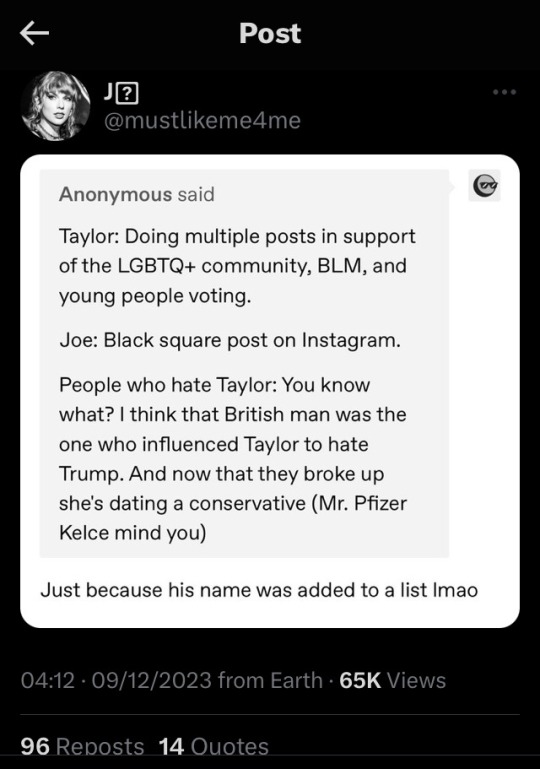
“multiple posts in support of the lgbtq community”
her LGBTQ “activism” pretty much started and ended with the lover era. she released the musical equivalent of “it’s ok to be gay,” she waited until she was in a blue state on the eras tour to even barely address the anti trans legislation that was being passed in OTHER states (states she had just performed in where her speech would’ve made much more of an impact). and telling people to go vote without specifying who you’re voting for or bringing attention to the important issues is not activism. it’s merely a voting reminder. which is fine, but, y’know, it doesn’t make you an lgbt advocate. which she promised to be as she accepted an award for it.
and despite the fact that she’s reportedly “spending a lot more time” in fuckass missouri to be with travis, she’s yet to say anything about the anti lgbt legislation being passed in that state.
she also went off tumblr because people asked her to talk about BLM and swifties act like it was the cruelest thing in the world to expect of her 🙄 but she made a whole thing in her documentary about wanting to be on the “right side of history.”
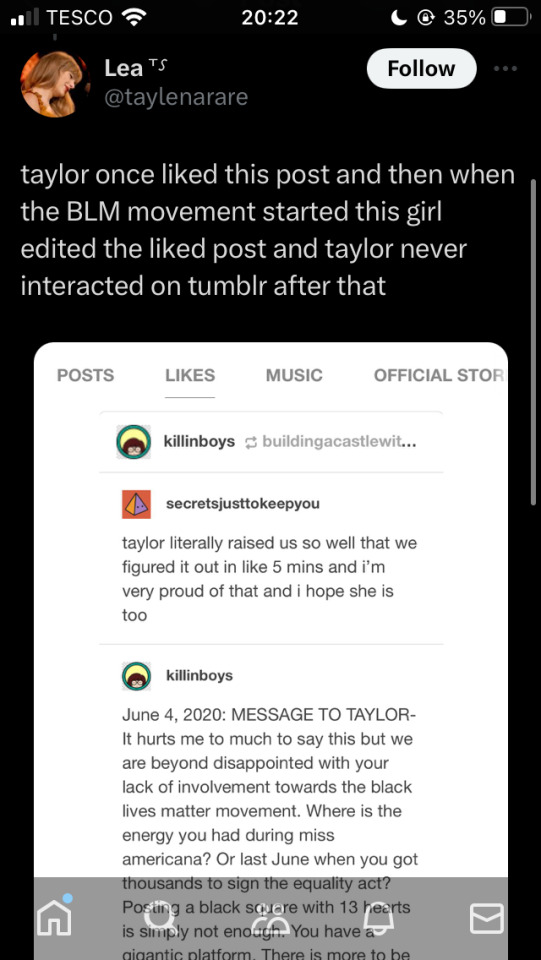
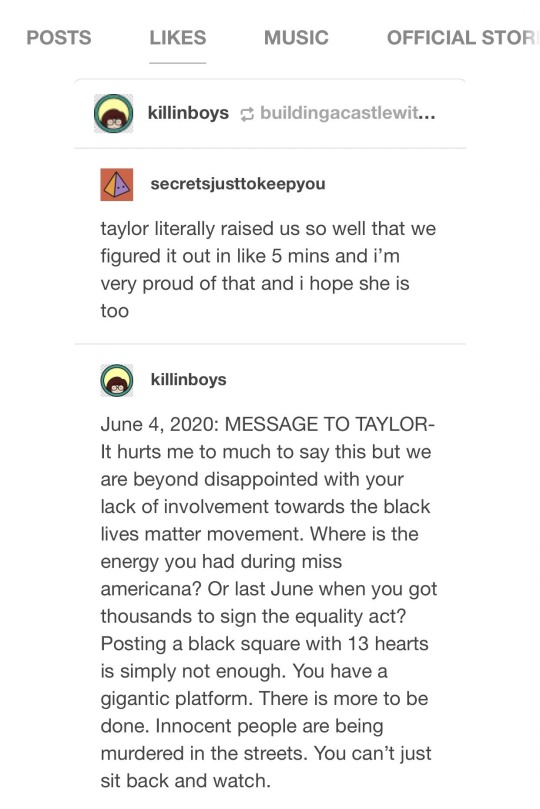
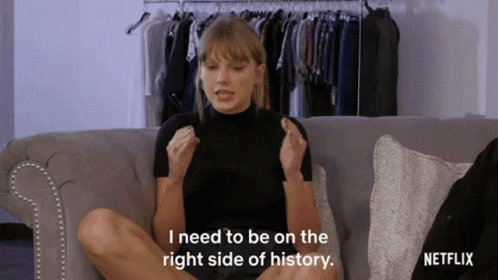
and taylor did the black square too so if you’re gonna attack joe for that 💀
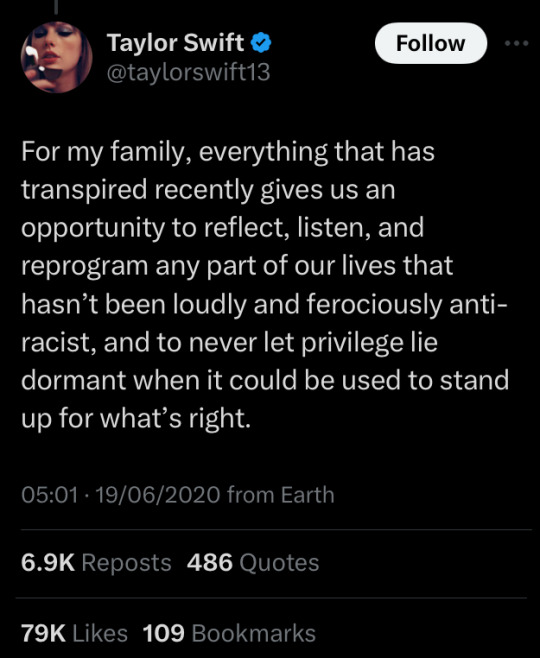
and she made some promises on twitter to be “loudly and ferociously anti-racist.” then she went on to date racist pos matty healy… and use ice spice as a shield. AND she also made sure that her publicist let everyone know that the “controversy” surrounding matty’s racism had NOTHING to do with her decision to split from him.
so… yeah.
these same miserable fucking swifties used to praise joe alwyn for speaking out against men abusing their power over women in hollywood but now their whole blogs are basically dedicated hate blogs to him. because he committed the crime of not marrying taylor so now they’ve decided he’s the worst man on the planet. 🙄
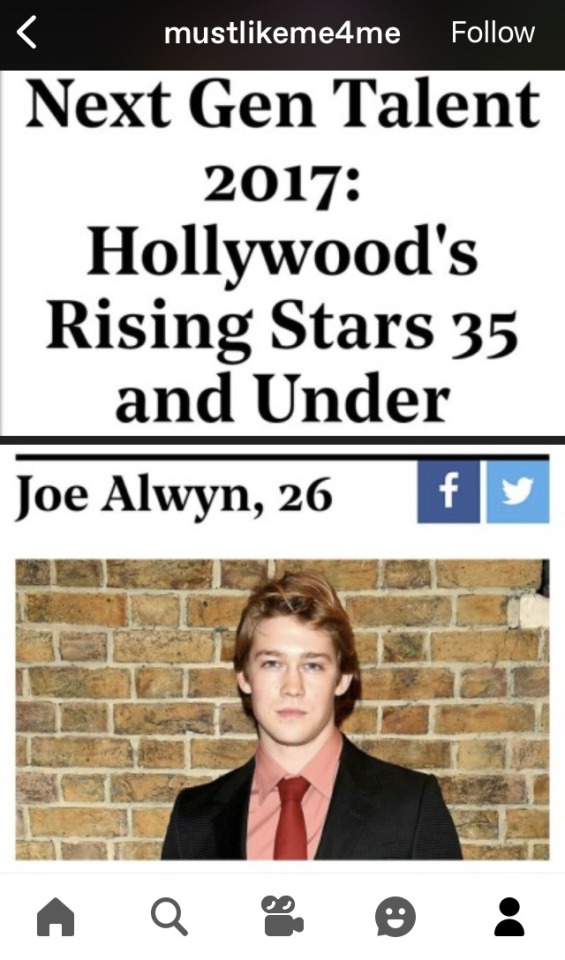
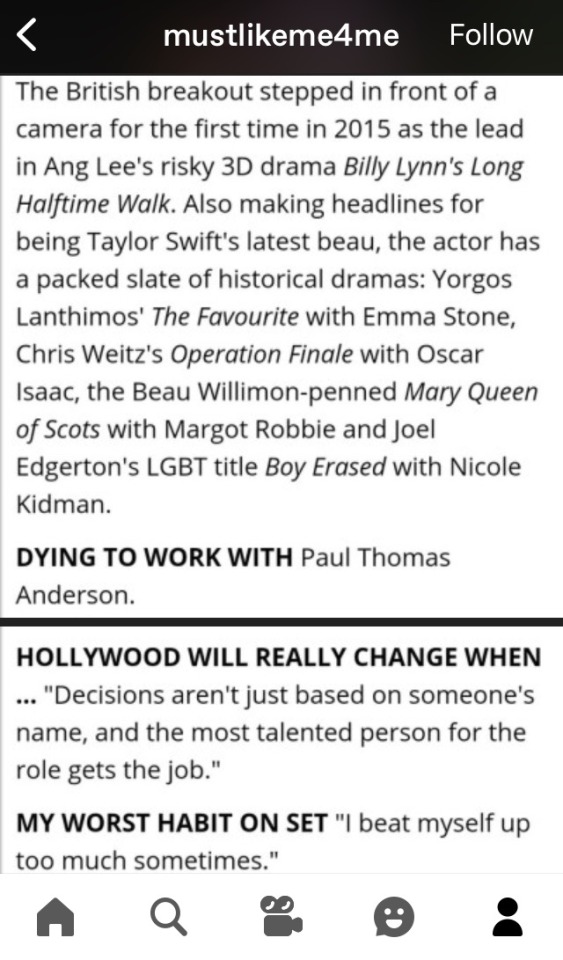
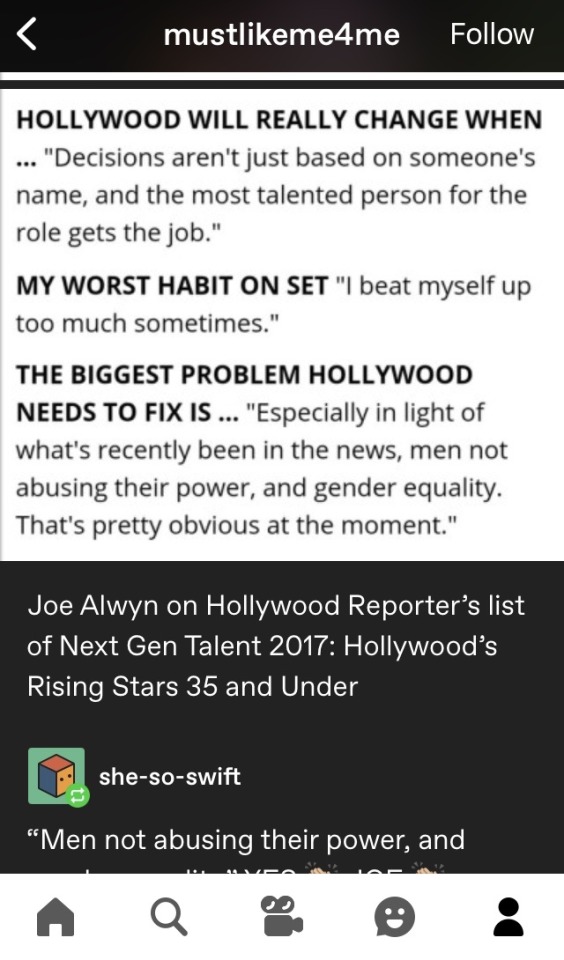
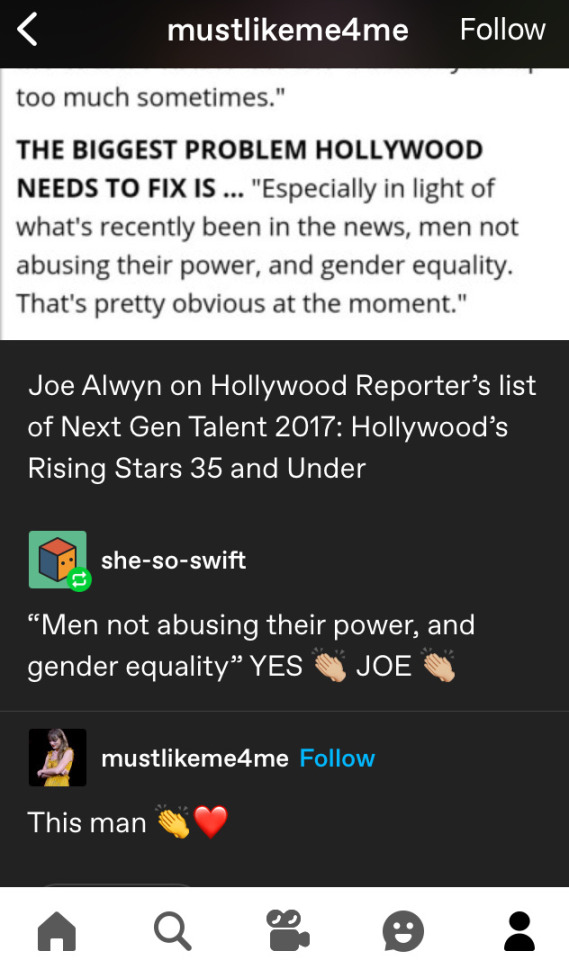
meanwhile taylor’s working with rapist directors, hanging out with SA apologists and high-fiving an abuser at football games. her feminism and “advocacy” is limited ONLY to herself and it’s painfully obvious she does not give a shit about anything that doesn’t directly affect her.
also, joe’s name wouldn’t have been added to that ceasefire letter if he didn’t WANT it added. it’s a risk to anyone in the entertainment industry to openly support palestine and no one’s name is going to be “just added” without their consent. signing that ceasefire letter may be bare minimum shit, but it’s still more than anything Miss Americana has said or done regarding this issue, which is absolutely nothing, and you have to ask yourself WHY.
also if you’re upset about people saying that taylor was encouraged to be more political because of joe… idk what to tell you that’s literally a canon event that came straight from taylor’s own mouth.
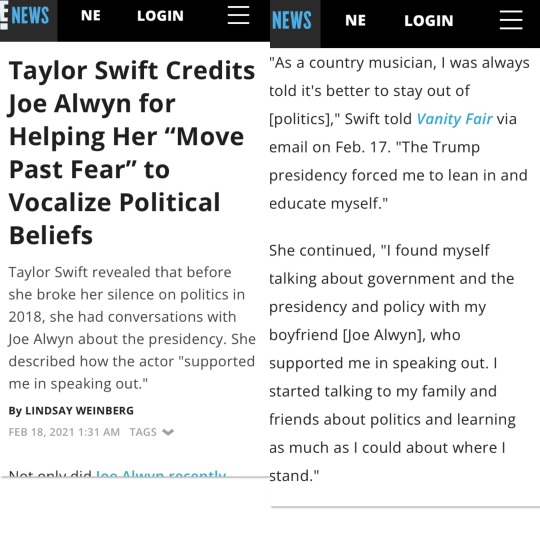
and it’s not that i think she’d be a trump supporter without joe but… it’s pretty obvious that since they’ve broken up (and even in the year leading up to the breakup) she’s not dared to do anything remotely resembling activism or being “controversial.” if anything she’s just too fucking narcissistic and self-absorbed to care about anything going on in the world, just like her bestie selena.
140 notes
·
View notes
Text
They don't know about that documentary ... America
It is known that a documentary on Prime Minister Narendra Modi, which was not made by the BJP, has created a lot of controversy. The documentary raised questions about the 2002 Gujarat riots and Narendra Modi's actions during the incident.America recently responded to this issue. We don't know about the documentary you are talking about. As two powerful democracies, America and India are well aware of their shared values. Indian democracy is strong. US State Department spokesperson Ned Price made it clear that our focus will be on what brings these two countries together.
He also said that they will think about the issues that will strengthen the bond between the two countries. He said that there are close political and economic relations between the two countries. He said that there is an inseparable bond between the people of America and India.

#Today news#Latest news#Indian Democracy#Documentary#Modi#US#BBC#Latest News Updates#Latest News#Trending News#Today News Updates#Telugu News Updates#telugu news updates#latest news updates#breaking news#today news updates#latest news#telugu times update
2 notes
·
View notes
Text
What are the most offensive British TV shows?
Identifying the "most offensive" TV shows can be subjective and vary depending on individual perspectives and sensitivities. However, there have been some British TV shows that have sparked controversy or faced criticism due to their content. Some examples include:
"Brass Eye" - This satirical news series created by Chris Morris often pushed boundaries with its humor, tackling sensitive topics like drugs, crime, and politics in a provocative manner.
"Little Britain" - While popular, this sketch comedy series by Matt Lucas and David Walliams faced criticism for its portrayal of various characters, which some viewers found offensive or stereotypical.
"The Jeremy Kyle Show" - Known for its confrontational style and often sensationalized content, this talk show faced backlash over its treatment of guests and ethical concerns regarding its approach to personal issues and conflicts.
"Benefits Street" - This documentary series about residents living on a street where many receive welfare benefits sparked controversy for its portrayal of poverty and reliance on social welfare, with some critics accusing it of exploitation and misrepresentation.
"Derek" - Created by Ricky Gervais, this comedy-drama series faced criticism for its portrayal of individuals with disabilities, with some viewers and advocacy groups finding it offensive or lacking authenticity.
0 notes
Text
Gender Politics and Social Media Conflict: The Case of Cassie Jaye
In the age of digital connectivity, navigating discussions around gender politics on social media platforms has become increasingly fraught with tension and hostility. The experience of filmmaker Cassie Jaye, as highlighted in her TED Talk, sheds light on the challenges individuals face when confronting entrenched beliefs and engaging with opposing perspectives. However, Jaye's experience is not just about personal growth; it reflects broader issues of media bias, online hostility, and the need to foster a culture of digital citizenship.
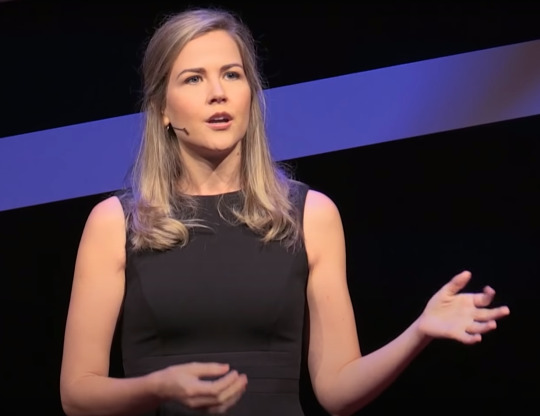
Jaye's journey began with a documentary project aimed at exploring the Men's Rights Movement—a topic often steeped in controversy within gender politics. Despite her feminist background, Jaye embarked on a year-long journey, interviewing a total of 44 Men's Rights Activists (MRAs) to gain a deeper understanding of their views. What she discovered challenged her preconceptions, leading her to reevaluate her own biases and assumptions. However, upon the release of her documentary "The Red Pill," Jaye faced a backlash characterized by smear campaigns and protests, reflecting the influence of groupthink within media discourse surrounding gender politics. Despite her intention to spark constructive dialogue, Jaye became the target of a vicious smear campaign, with individuals protesting outside theatres chanting that her film was harmful to women. This hostile reaction illustrates how entrenched beliefs can lead to knee-jerk reactions and attempts to silence dissenting voices. This phenomenon is not isolated to Jaye's experience but reflects a broader pattern of online hostility that poses a significant threat to digital citizenship. As Thompson (2023) warns, online hostility can result in psychological and physical harm, reinforcing the subordination of marginalized groups and impeding their online participation. Moreover, gendered cyberhate, as argued by Jane (2018), exacerbates existing digital divides, hindering individuals' ability to engage in productive online discourse and exercise their digital rights.

In response to these challenges, fostering a culture of digital citizenship is essential. Instead of expecting not to be offended, as Jaye suggests, we must embrace the imperative to truly, openly, and sincerely listen. After all, equality should not be about punishing the other side, it should be about lifting each other up.
Reference:
Jane, E. A. (2018). Gendered cyberhate: A new digital divide? In Theorizing Digital Divides, 186–198. Routledge. https://doi.org/10.4324/9781315455334-15
Thompson, J. D. (2023, March 17). New journalism research will help mitigate the harms of online hostility. Freilich Project for the Study of Bigotry. https://freilich.anu.edu.au/news-events/blog/new-journalism-research-will-help-mitigate-harms-online-hostility
0 notes
Text
Lincoln Mondy grew up in a mixed race family in Texas, where his white mother's family used regular tobacco, unlike his Black father.
"My dad exclusively smokes menthol cigarettes," he says. "Menthol was such a part of Black culture. And I knew that Black people smoked menthol and that was just a fact."
The 29-year-old filmmaker turned his curiosity about race and menthol tobacco into a documentary on the topic he produced for the Truth Initiative, an anti-smoking advocacy group.
He then realized how menthol's popularity with the Black community came from decades of racially targeted marketing, including ads (such as the Kent Menthol ad shown above) depicting Black models in Black magazines like Ebony, and cultural events in Black neighborhoods — like the KOOL Jazz festival, sponsored by the menthol brand. "They really created menthol as a Black product," Mondy says.
Now, as a proposed ban on menthol remains in limbo since the Biden administration put it on hold in December, lobbying and debate continues about how the ban would impact Black smokers.
Not only is the minty, cooling flavored tobacco most heavily marketed and consumed in Black communities, where over 80% of smokers use menthol, it is a big reason Black men face the highest rate of lung cancer, says Phillip Gardiner, a public health activist and co-chair of the African American Tobacco Control Leadership Council. Latino and LGBTQ communities as well as women were also targeted, he says.
The minty, cooling flavor of menthol masks the smoke and soothes the throat, making it easier to inhale deeply. "The more deeply you inhale, the more nicotine and toxins you take and the more addicted you become," and the more lethal the product, Gardiner says.
That history is why efforts to ban menthol cigarettes and cigars have always been entwined with race. Menthol has become a flashpoint of controversy, dividing Black leaders and their communities.
The Food and Drug Administration was set to enact a long-awaited ban on menthol cigarettes and cigars last August. The rule detailing the ban has already been written but needed to be approved by the White House's Office of Management and Budget before it could be finalized. The White House since delayed it until March, and agreed to hold meetings with groups opposed to the rule. This angered activists like Gardiner.
"It's ridiculous; thousands of lives are being lost because of the inactivity of the FDA and now the White House," he says. Gardiner says the delays are the result of the industry wielding its financial influence within the Black community.
Late last year, tobacco giant Altria recently sponsored a poll finding a menthol ban would sway more Black voters against President Biden. Details of that poll have not been released, and NAACP CEO Derrick Johnson refutes its findings, saying in a video statement, "we're the largest civil rights organization in the Black community in 47 states across the country; no one has raised this as a political issue."
One of the most vocal and influential voices against menthol bans is Reverend Al Sharpton. Sharpton and his group, National Action Network, didn't respond to requests for comment, but in the past, they've acknowledged working with and receiving funding from tobacco companies— including in fighting in New York state, which has considered a menthol ban.
"Smoking is bad for you, no question about it, but if it's a health health issue, why aren't you banning all cigarettes," Sharpton says to a cheering crowd, in a video from a speech at a 2019 National Action Network event. Implied in a menthol ban, he says is the notion that "whites know how much to smoke and we don't know how much to smoke."
More recently, in lobbying against a federal ban, Sharpton has also repeated his argument, including in a letter to White House's domestic policy advisor Susan Rice that it would lead to more over-policing of Black people. He cites the death of Eric Garner at the hands of New York City police during an arrest on suspicion of selling loose untaxed cigarettes.
In fact, a federal menthol ban would not outlaw individuals from possessing or using those cigarettes, but bar the manufacture and sale of them.
But Lincoln Mondy, the filmmaker, says coming from respected leaders like Sharpton, messages that tap into existing fears about aggressive policing can be deeply confusing and divisive for the Black community.
"My granny has pictures of Al Sharpton on her mantle, along with Jesus," he says. "Especially for our elders, you have Black leaders who are selling this tobacco PR line around policing and [messages like]: 'They're just trying to take things away from Black people.'"
He and others say the delays in the federal menthol ban have already handed the industry a win. In places like California and Massachusetts that already banned menthol, the tobacco industry is now selling menthol-like flavors that aren't technically menthol, and therefore not subject to those new laws.
A similar end run, he says, would be likely if any national ban were to take effect.
0 notes